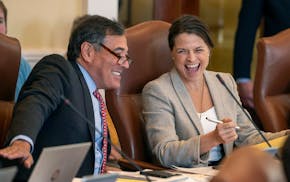Acting with bipartisan force and unusual speed, the Minnesota Legislature voted overwhelmingly Thursday to extend a health insurance program that covers Minnesota's poorest and sickest citizens -- only to find Gov. Tim Pawlenty waiting at the end of the day with a veto.
Pawlenty issued his veto from Washington, D.C., where he was preparing for a major political conference.
The day's events only escalated an emotional showdown among the governor, legislators and health care advocates over General Assistance Medical Care (GAMC), a program seen as a key safety net covering 35,000 poor adults in a typical month.
The governor, who will address the Conservative Political Action Conference Friday, said the measure "irresponsibly spends $170 million" and called out Republicans who approved it, through spokesman Brian McClung. "Both DFLers and Republicans who voted for this bill should be held accountable for taking out the state's checkbook when there's not only no money, but a deficit," McClung said.
The drama could resume as soon as Monday, when DFLers have threatened to attempt a veto override.
"I know some hospitals in rural Minnesota who are very concerned about the loss of GAMC," said Rep. Tom Huntley, DFL-Duluth. "They're going to be calling their [Republican] legislators."
The bill's other chief sponsor, Rep. Erin Murphy, DFL-St. Paul, accused the governor of being largely absent from the debate: "It's like he's already left Minnesota. I think you're going to see a lot more leadership from both [Democrats and Republicans] in the Legislature."
House vote was 125-9
Lawmakers have grappled with ways to fix the state's $1.2 billion deficit, but still the House passed the bill 125-9 Thursday afternoon and, just a few hours later, the Senate voted 47-16 to send it to the governor. All the no votes came from Republicans.
It would take just three House Republicans joining Democrats to pass the bill over Pawlenty's veto. Senate Democrats have 46 members -- enough to override a veto without Republican support.
While only nine House Republicans voted against the measure Thursday, House leaders expressed confidence that none of their members would take the more dramatic step of voting to override the governor.
"We will uphold the governor's veto no matter what the issue," House Minority Leader Kurt Zellers, R-Maple Grove, said Thursday night. Earlier Thursday, Zellers got to his feet on the House floor to call the measure a "great step forward," voting to approve it.
Rep. Jim Abeler, R-Anoka, is no stranger to voting against Pawlenty -- he joined in a vote to override the governor's gas tax veto in 2008. But he said Thursday night that he won't support an override this time.
"It would be a very easy no vote for me, because the bill needs work," Abler said. He said he had expected a joint House-Senate committee to work out kinks in the measure, as usually happens, before it went to the governor.
Months of pressure
Last year, in an effort to address the state's budget deficit, Pawlenty vetoed funding for GAMC, which covers single adults who earn less than $8,000 a year and are generally ineligible for the state/federal Medicaid program. Nearly a third of the recipients are homeless, 70 percent are mentally ill or drug addicted -- or both -- and some are veterans struggling to cope with life after war.
Since that veto, advocates, including counties, hospitals and the disabled, have waged a vigorous program of calls, lobbying and rallies to bring the program back. Without a fix, the program will end April 1.
On Wednesday, Minnesota's Roman Catholic bishops added their voice to the drumbeat of support, calling GAMC "a matter of justice [for] our neighbors with the greatest needs."
"More people contacted us about this than about any other issue," said Rep. Matt Dean, R-Dellwood.
The measure approved Thursday reduces payments to health care providers, who nonetheless championed it as better than nothing.
The state's hospitals have said that unless the program is extended, they would lose more than $90 million in uncompensated care for GAMC patients; the Department of Human Services puts the loss at closer to $30 million.
Bill would be a stop-gap
Despite the lopsided vote, the GAMC bill is one that nobody loves. It covers only a portion of costs for medical providers who treat GAMC patients, requires counties to give up some money and is intended only as a stopgap until something better comes along from the Legislature or Congress.
DFLers have been pinning their hopes on congressional action to expand Medicaid, but that action has stalled.
The measure approved Thursday would cost $283 million over 16 months, an average of $459 a month for care of 85,000 people who cycle through the program over the 16 months, Murphy said. By contrast, she said, the 21,000 people to be moved to MinnesotaCare under the governor's plan would cost an average of $724 a month, a total of $254 million.
Warren Wolfe • 612-673-7253 Rachel E. Stassen-Berger • 651-292-0164
The Latest | Jury selection enters a pivotal stretch as Trump's hush money trial resumes
Nancy Pelosi book, 'The Art of Power,' will reflect on her career in public life
Former Wisconsin Democratic Rep. Peter Barca announces new bid for Congress
